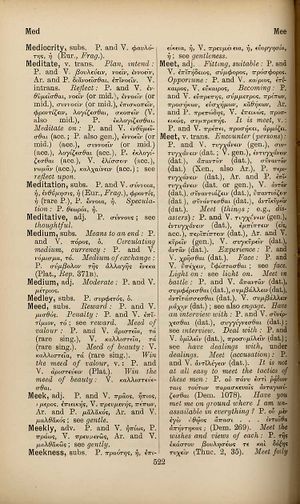meditate
ὁ γοῦν Ἀνάγυρός μοι κεκινῆσθαι δοκεῖ → did somebody fart, seems to me the Anagyros has been stirred up, I knew someone was raising a stink, the fat is in the fire
English > Greek (Woodhouse)
trans.
Plan, intend: P. and V. βουλεύειν, νοεῖν, ἐννοεῖν, Ar. and P. διανοεῖσθαι, ἐπινοεῖν. V. intrans. Reflect: P. and V. ἐνθυμεῖσθαι, νοεῖν (or mid.), ἐννοεῖν (or mid.), συννοεῖν (or mid.), ἐπισκοπεῖν, φροντίζειν, λογίζεσθαι, σκοπεῖν (V. also mid.), P. ἐκλογίζεσθαι. Meditate on: P. and V. ἐνθυμεῖσθαι (acc.; P. also gen.), ἐννοεῖν (or mid.) (acc.), συννοεῖν (or mid.) (acc.), λογίζεσθαι (acc.), P. ἐκλογίζεσθαι (acc.), V. ἑλίσσειν (acc.), νωμᾶν (acc.), καλχαίνειν (acc.) , see reflect upon.
Latin > English (Lewis & Short)
mĕdĭtātē: adv., v. meditor.
Latin > French (Gaffiot 2016)
mĕdĭtātē¹⁴ (meditatus), à dessein, de propos délibéré : Sen. Const. 11, 3 || avec réflexion, précision : Pl. Bacch. 545 ; Mil. 40.

